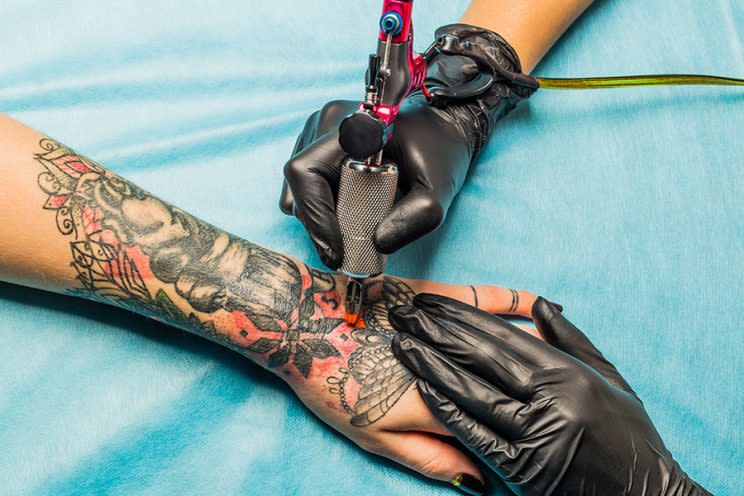You Might Want to Rethink That Tattoo

The U.S. Food and Drug Administration (FDA) has updated its guidelines on tattoos — and the information that the agency included is enough to make even the most seasoned ink lover pause.
In the update, titled Think Before You Ink: Are Tattoos Safe? the FDA points out that it received 363 reports of bad reactions to tattoos from 2004 to 2016. Linda Katz, MD, director of the FDA’s Office of Cosmetics and Colors, said in the post that there are a host of things you should be worried about when you get inked, including potential infections from contaminated tattoo inks, allergic reactions, and even bad ink.
Most people are aware that they should only visit a tattoo parlor that uses sterile equipment, but Katz noted that people can still get an infection from ink that was contaminated with bacteria or mold. “Using non-sterile water to dilute the pigments (ingredients that add color) is a common culprit, although not the only one,” she said. Unfortunately, there’s no way to tell in advance if the ink is safe, and ink can be contaminated even if the container is sealed or the label says it’s sterile.
Newsletter: The Yodel
Trusted news and daily delights, right in your inbox
See for yourself — The Yodel is the go-to source for daily news, entertainment and feel-good stories.
People who develop an infection from a tattoo can get a high fever, shaking, chills, and sweats, and may need to take a course of antibiotics, possibly for months. In more extreme cases, hospitalization and surgery may be needed. People can also develop a rash caused by an allergic reaction to the ink that may not go away, since tattoos are permanent. Scar tissue is also a concern — essentially, you can end up with bumps around your tattoo.
Gary Goldenberg, MD, medical director of the Dermatology Faculty Practice at the Icahn School of Medicine at Mount Sinai, tells Yahoo Beauty that he’s seen many reactions to tattoos in his practice, adding that he sees “at least several cases a year.” Those have included allergic reactions; bacterial, mold, and fungal infections; and a reaction that looks like sarcoidosis, tiny collections of inflammatory cells that cause lumps to form. Goldenberg says he’s even seen the development of a form of skin cancer called keratoacanthoma right after someone got a tattoo.
Joshua Zeichner, MD, a New York City-based board-certified dermatologist, tells Yahoo Beauty that tattoo allergies aren’t uncommon, and the most common culprit is a pigment called PPD (paraphenylenediamine). “These allergies are difficult to treat because tattoos are permanent,” he says.
If you develop an allergic reaction to a tattoo, Goldenberg recommends calling your dermatologist. The reaction can be treated with topical, oral, or injection medication, such as steroids, he explains, and an allergy test can be performed to determine which pigment you may be allergic to. In some cases, the tattoo may need to be removed with a laser, Zeichner says.
It can be hard to know whether you’ll have a reaction to a tattoo, but Zeichner notes that people who have a history of allergies to hair dyes shouldn’t get inked because the tattoo pigment may cause a similar reaction.
It’s worth noting that many people get tattoos and have no side effects: The FDA even cites a 2015 Harris Poll that found that about 30 percent of people surveyed had at least one tattoo, and 363 people are just a tiny portion of that. But still, there is a risk.
Read more from Yahoo Style + Beauty:
Follow us on Instagram, Facebook, and Pinterest for nonstop inspiration delivered fresh to your feed, every day. For Twitter updates, follow @YahooStyle and @YahooBeauty.
Solve the daily Crossword

